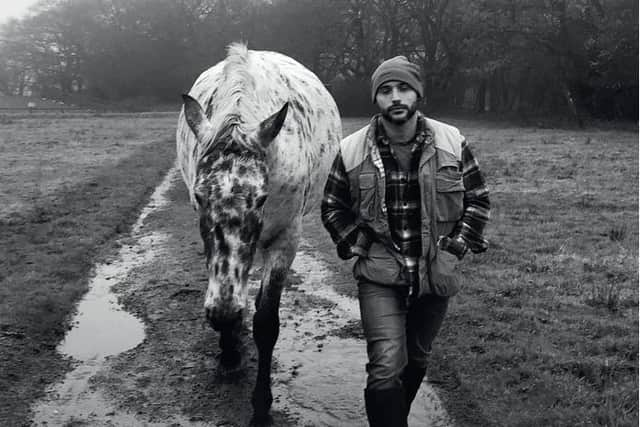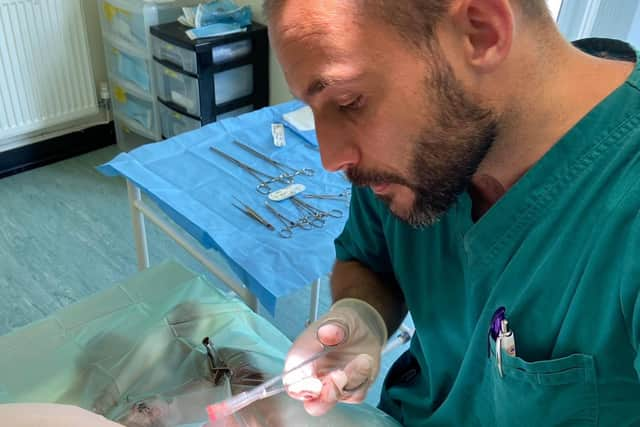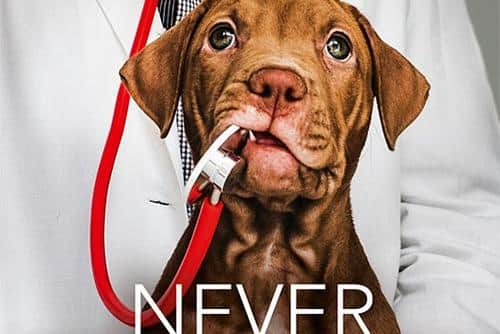Gareth Steel's new book, Never Work with Animals, reveals the truth about being a vet
This article contains affiliate links. We may earn a small commission on items purchased through this article, but that does not affect our editorial judgement.
Over the last couple of years, people have gone animal crackers.
Not only are there endless dog and cat related programmes on the telly, apparently 3.2 million people have bought a new fluffy companion since the first lockdown.
Advertisement
Hide AdAdvertisement
Hide AdIf you love hearing sentimental stories, don’t be sucked in by the adorable puppy on the cover of the new book Never Work with Animals: The Unfiltered Truth About Life as a Vet by Gareth Steel, who is originally from Dumfries & Galloway and graduated in Veterinary Medicine from the University of Glasgow in 2003.


In the same way that the best-selling book This is Going to Hurt by Adam Kay, which has just been made into a BBC One television series, is a warts and all memoir on life as a doctor, Steel’s read does the same for the veterinary profession.
“We’ve got books from celebrity vets and ones that are warm and fuzzy, but nobody has ever written anything that’s really candid, and that was the idea”, says Steel, who lives in South Wales.
The book covers his sometimes 100 hour weeks, bovine tuberculosis, calving and lambing, rescuing horses from overeating misadventures, operations on egg-bound hens, saving bunnies - specifically Bart the rabbit, who he rescues from the side of a shed using ski poles - and other creatures from all kinds of sticky situations and illnesses.
As well as real life analogies, he also expounds on meat eating, vaccines, pet insurance, the suicide rate among vets, which is four times higher than the national average, and the health conditions of designer dog breeds.


The manuscript was completed during lockdown, when this vet had a brief respite from his all consuming day job.
“I started to put some of it down on paper about four years ago, and it was one of those things I promised myself I was going to finish”, says Steel. “At the start of the pandemic, I caught Covid and had to self isolate for two weeks and I thought, this is my chance. My dad was staying with us, and I’d pass him and my wife the chapters and say, what do you think? The poor souls had to read various bits of the book and try to help me out. If I was to offer criticism of their criticism it was that they probably weren’t harsh enough”.
Steel’s book agent had originally asked if he had a Kay-esque diary that they could publish, but he hadn’t kept one over his 20 years in the profession.
Advertisement
Hide AdAdvertisement
Hide AdInstead, he ended up writing something that isn’t chronological, but tells individual stories with vaguely thematic links. Much of it is serious, but it’s funny too. It has to be. As Steel says, being a vet is a “rollercoaster, emotionally”.


“There's some really interesting research that a dark sense of humour is very much a psychological coping mechanism for people in high stress or difficult jobs and that, actually, it's linked to mental health,” says Steel. “I don't think you could psychologically survive in a profession without having a little bit of that”.
Some of the darkly amusing parts of the book include the examination of Sticky the stick insect, who hasn’t moved for a while, and dissolves into twigs and dust when Steel - who has to quickly swot up whenever he gets an exotic pet in his surgery - attempts to examine him.
It turns out that this insect had crept across the rainbow bridge a very long time ago.
“It's funny and tragic simultaneously,” says Steel. “It can be hard to deal with that in front of owners. You have to keep a straight face at the time”.
It’s not just doctors who have to have a good bedside manner. In Never Work with Animals, the author demonstrates endless patience and understanding with his real customers - people. All of his clients have been kept anonymous, and the stories tweaked to protect their identity.
However, there are those who casually neglect their furry, scaled or feathery wards, while others will do anything, including paying vast amounts of cash to save their pets. In one chapter, a couple don’t even want to discuss money, when it comes to saving their Staffy, who they see as their child.
In another, a woman brings her young and healthy spaniel in to be euthanized, in order to punish her children, as they haven’t been looking after it as they’d promised.
Advertisement
Hide AdAdvertisement
Hide AdSteel refuses, naturally, and explains to the woman that she’s maybe not teaching her offspring the right sort of lesson.
“That was a really strange episode”, he says. “You do get people coming in saying their dog has bitten them. You look at the dog, wagging its tail and think, there’s just no way. Maybe in extremis, but it’s not an aggressive dog. They’re not necessarily bad people, often there’s something going on in their life, whether it be relationship breakdown or financial stress. Sometimes we can offer them an alternative, whether that be re-homing or looking at a dog walker. For older people, there are charities like the Cinnamon Trust”.
Steel has resisted getting his own dog until now, though he does have a cat called Loki. However, at the end of 2021, he and his wife were volunteering to neuter and vaccinate street dogs in Sri Lanka, and now they’ve got a pup coming over to live with them in March.
“We were actually working out of this semi-constructed Buddhist monastery and she was living in that building”, says Steel. “Of course, she's hanging around every day, then we picked her up and found out she was really playful. The next thing you know, you're paying for £4000 worth of flights”.
Never Work with Animals by Gareth Steel is out now, Harper Element, £14.99